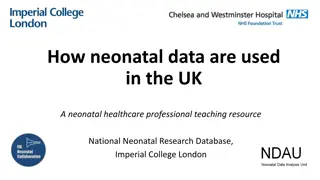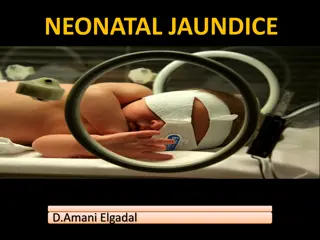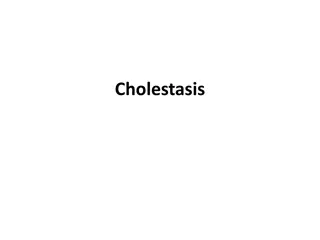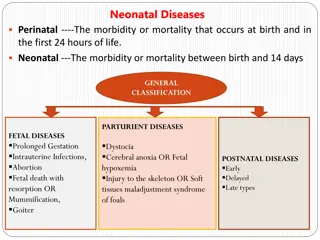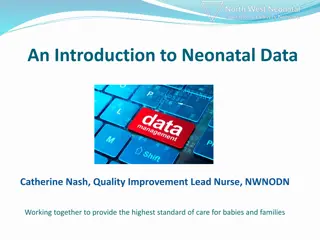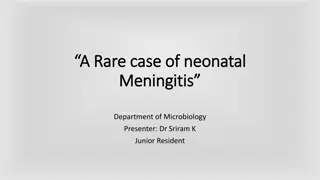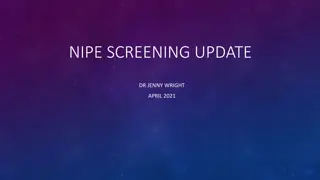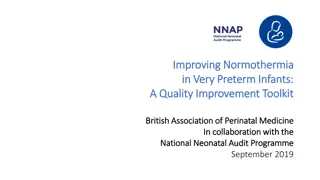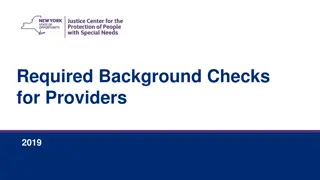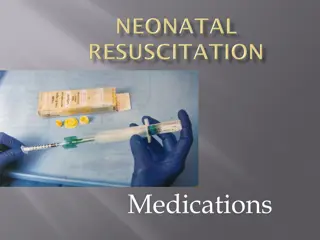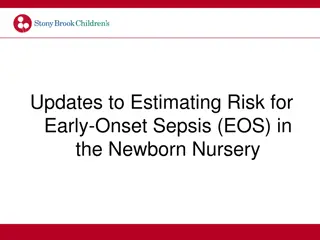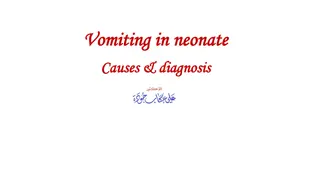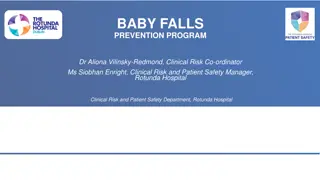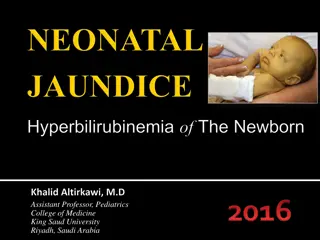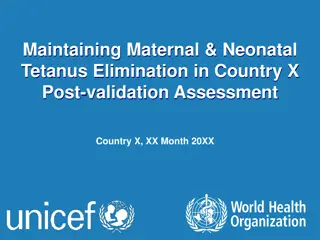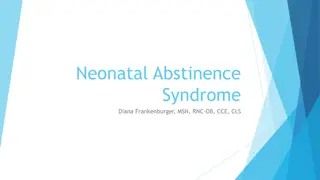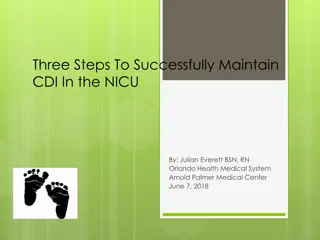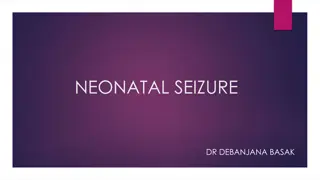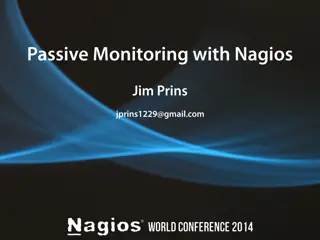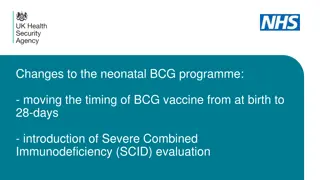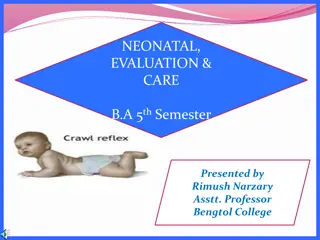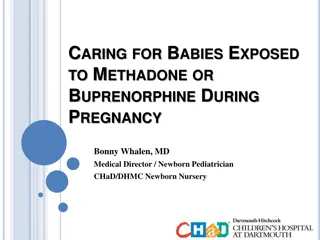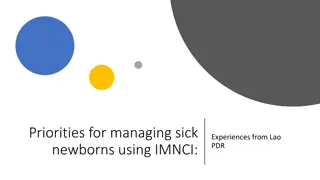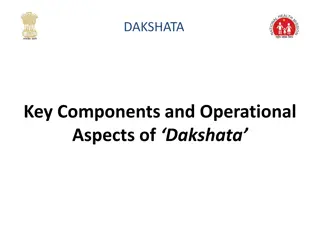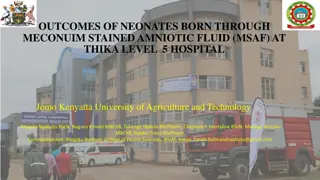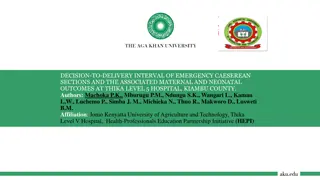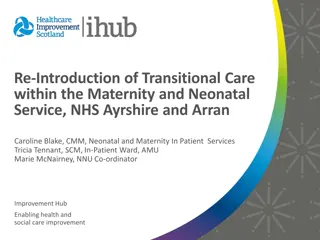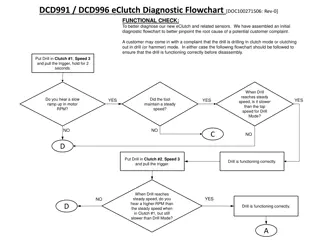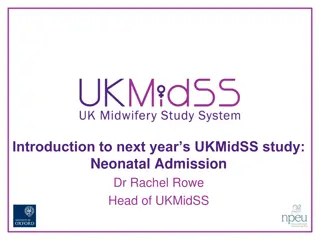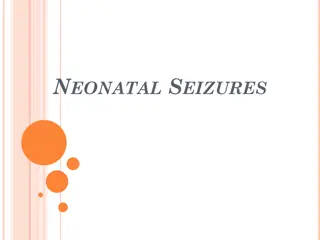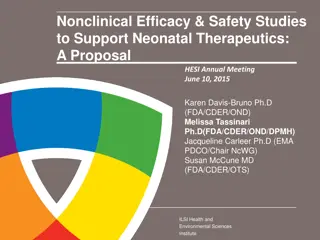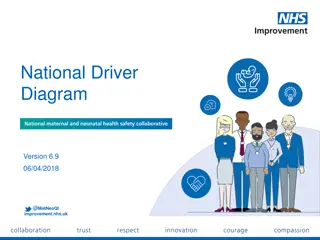Understanding Neonatal Data Usage in the UK Healthcare System
Neonatal data plays a crucial role in assessing the quality of care provided to newborns in the UK. This resource from the National Neonatal Research Database at Imperial College London sheds light on how neonatal data is collected, utilized, and shared among healthcare professionals. The importance
1 views • 24 slides
NEONATAL JAUNDICE
Neonatal jaundice, a common condition in newborns, results from elevated bilirubin levels. While often benign, high levels can lead to complications like kernicterus. Recognizing risk factors, limitations of clinical assessment, and appropriate evaluation and treatment are crucial in managing neonat
1 views • 48 slides
Point-of-Care Ultrasound in Neonatal ETT Positioning
Point-of-care ultrasound (POCUS) is emerging as a potential tool for confirming endotracheal tube (ETT) positioning in neonates, providing a viable alternative to X-ray examination. The study aims to assess the accuracy of POCUS in determining ETT placement, particularly by using the superior aspect
2 views • 25 slides
USA Archery (USAA) Background Check Policy
USA Archery (USAA) implements a comprehensive Background Check Policy to ensure the safety of athletes and individuals associated with the organization. The policy outlines who is required to undergo background checks, the rationale behind the program, the process involved, and the information requi
0 views • 5 slides
Understanding Cholestasis: Etiology, Clinical Manifestations, and Complications
Cholestasis is characterized by reduced bile flow and elevated direct bilirubin. It is critical to differentiate it from neonatal jaundice. In conditions like biliary atresia and 1-antitrypsin deficiency, early diagnosis and intervention are crucial to prevent liver failure. Clinical manifestations
5 views • 14 slides
Neonatal Diseases
Neonatal and postnatal diseases in livestock, with a focus on perinatal, neonatal, and postnatal stages. It covers common classifications, causes, and risk factors associated with these diseases, particularly focusing on neonatal diarrhea (Calf Scour). The content delves into noninfectious and infec
0 views • 33 slides
Neonatal Data Collection and Utilization in Quality Care
Dive into the world of neonatal data with Catherine Nash, where the focus lies on the importance of collecting and utilizing data effectively to enhance care standards for babies and families. Discover how data systems like BadgerNet play a vital role in monitoring care, diagnosing treatments, measu
0 views • 7 slides
Understanding the Organization of NICU: A Comprehensive Guide
The organization of a Neonatal Intensive Care Unit (NICU) plays a vital role in reducing neonatal mortality and improving the quality of life for newborns. This comprehensive guide covers the objectives, definition, basic facilities, levels of care, and components of a NICU. It emphasizes the import
0 views • 60 slides
Rare Case of Neonatal Meningitis with Antibiotic Challenge
A term male baby born with perinatal hypoxia developed neonatal meningitis with convulsions. Blood culture revealed Acinetobacter sp. and Pseudomonas sp. Empirical antibiotic therapy was escalated to Colistin and Ceftazidime due to resistance. Subsequent testing showed colonies resembling Pseudomona
0 views • 17 slides
Newborn Infant Physical Examination (NIPE) and Neonatal Checks Overview
Essential information on the NIPE screening update, neonatal checks, learning outcomes, eye examination, heart and CVS examination, and hips assessment for newborns. This content emphasizes early identification of abnormalities, top-to-toe examination, referral guidelines, and critical assessments t
0 views • 11 slides
Quality Improvement Toolkit for Improving Normothermia in Very Preterm Infants
This resource provides a comprehensive toolkit developed by the British Association of Perinatal Medicine in collaboration with the National Neonatal Audit Programme to assist clinicians in neonatal units in delivering normothermia to very preterm infants. It includes evidence-based interventions, d
1 views • 17 slides
Understanding Required Background Checks for Providers in 2019
Explore the essential background check requirements for providers in 2019, covering topics like Staff Exclusion List (SEL) checks, Criminal Background Checks (CBC), authorized person responsibilities, and temporary approvals. The checks are crucial for applicants with substantial contact with servic
1 views • 64 slides
Maternity and Neonatal Safety Improvement Programme Overview
The Maternity and Neonatal Safety Improvement Programme aims to enhance the quality and safety of maternity and neonatal units in England by reducing rates of maternal and neonatal deaths, stillbirths, and brain injuries. Through system-level project updates and regional collaborative efforts, the p
2 views • 70 slides
Neonatal Medication Administration and Resuscitation Overview
Neonatal resuscitation may involve administering medications like epinephrine and volume expanders in specific situations such as hypovolemic shock. Before giving medications, ensure proper ventilation and compressions. Epinephrine helps with coronary artery perfusion and oxygen delivery, while volu
1 views • 15 slides
Neonatal Care at Lagos University Teaching Hospital (LUTH)
Lagos University Teaching Hospital (LUTH) is a tertiary referral center providing comprehensive neonatal care services. The facility has specialized units for inborn and outborn babies, offering advanced medical care, including neonatologists, resident doctors, nurses, and support staff. LUTH also h
0 views • 15 slides
Understanding Early-Onset Sepsis (EOS) Risk Factors and Management in Newborns
Neonatal Early-Onset Sepsis (EOS) is a rare but life-threatening condition primarily caused by Group B Streptococcus (GBS) or Escherichia coli. Recognizing risk factors such as maternal age, intrapartum fever, GBS colonization, and certain neonatal characteristics is crucial for timely evaluation an
0 views • 26 slides
Neonatal Vomiting: Causes, Diagnosis, and Differential Diagnosis
Neonatal vomiting can be a concern when presenting with bile-stained or blood-stained vomit, projectile vomiting, or associated with weight loss and failure to grow. Various non-surgical and surgical conditions like Pyloric Stenosis can lead to vomiting in neonates. Common causes include Mid-gut vol
0 views • 16 slides
Baby Falls Prevention Program at Rotunda Hospital
The Baby Falls Prevention Program at Rotunda Hospital aims to reduce the incidence of postpartum neonatal falls, which can cause serious harm to newborns. By increasing staff awareness, educating parents, and introducing safer adult beds and neonatal cots, the program seeks to mitigate the risk of h
0 views • 4 slides
Understanding the Importance of Annual Health Checks for Learning Disabilities
Learning Disabilities Champion Training Module 1 delves into why annual health checks are crucial for individuals with learning disabilities. The course emphasizes the need for LD Champions to organize and complete these checks efficiently. It addresses the significantly higher mortality rates among
4 views • 27 slides
Understanding Neonatal Jaundice: A Guide for Medical Students
This presentation by Dr. Khalid Altirkawi, M.D., Assistant Professor of Pediatrics, aims to educate medical students on neonatal jaundice. The content covers metabolic pathways of bilirubin, types of jaundice, diagnostic tests, prevention, and treatment strategies. It provides valuable insights into
0 views • 52 slides
Maintaining Maternal & Neonatal Tetanus Elimination: Post-validation Assessment in Country X
This post-validation assessment report delves into the efforts to maintain Maternal & Neonatal Tetanus Elimination in Country X. It includes findings from field assessments, recommendations for sustaining the elimination status, and the critical role of surveillance in addressing vulnerable populati
3 views • 19 slides
Understanding Neonatal Abstinence Syndrome (NAS) and Opioid Crisis Impact
Neonatal Abstinence Syndrome (NAS) is a condition where infants experience withdrawal symptoms from exposure to drugs in utero, with a significant impact seen in regions like southeastern Kentucky due to the opioid crisis. This syndrome manifests through various short and long-term effects, necessit
0 views • 30 slides
Three Vital Steps for CDI Maintenance in the NICU
Learn how to successfully maintain Clinical Documentation Improvement (CDI) in the Neonatal Intensive Care Unit (NICU) through the implementation of three crucial steps. This includes understanding the neonatal population, mastering specific medical terminology, and capturing relevant query opportun
0 views • 13 slides
Understanding Neonatal Seizures and Their Pathophysiology
Neonatal seizures are sudden changes in neurologic function of a newborn, involving motor, behavior, and autonomic functions. The pathophysiology includes delays in Na/K ATPase maturation, increased receptor density, and GABAergic transmission. Different types of seizures like subtle, clonic, tonic,
1 views • 24 slides
Managing Passive Host and Service Checks with Nagios Core
Learn how to enable passive host and service checks in Nagios Core via the configuration file, allowing for monitoring without actively polling the hosts and services. Understand the setup, configuration, and usage of passive checks in your monitoring system. Explore examples and best practices for
0 views • 30 slides
Changes to Neonatal BCG Programme: Updated Timing and SCID Evaluation
The Neonatal BCG Programme has undergone changes, including shifting the timing of the BCG vaccine administration from birth to 28 days and introducing Severe Combined Immunodeficiency (SCID) evaluation. This session aims to educate on the modifications for safe practice. The BCG immunization progra
1 views • 12 slides
Understanding the Neonatal Period: Care and Evaluation
The neonatal period, also known as the newborn stage, encompasses the first 28 days of a baby’s life, characterized by rapid changes and fragility. This crucial stage requires specialized care, with sub-divisions such as the Period of the Partunate and Period of the Neonate. Commonly, neonates may
0 views • 19 slides
Understanding Neonatal Abstinence Syndrome: A Guide for Parents
Babies exposed to methadone or buprenorphine during pregnancy may develop Neonatal Abstinence Syndrome (NAS), which can lead to various Central Nervous System, Autonomic Nervous System, and gastrointestinal issues. Symptoms usually peak between the 3rd and 4th day of life and may require monitoring
0 views • 27 slides
Challenges Faced by Babies in the Early Neonatal Period When Mother Had PPH
Babies face unique challenges in the early neonatal period when their mothers experience PPH. The outcomes vary based on whether the mother survives or not, affecting factors like delayed cord clamping, skin-to-skin contact, breastfeeding, and maternal care. Premature birth, birth asphyxia, and norm
0 views • 7 slides
Insights on Improving Newborn Care with IMNCI in Lao PDR
Under-5 mortality rates are showing improvement, yet neonatal mortality lags behind. Addressing this requires a focus on neonatal care, particularly through the implementation of IMNCI protocols. The use of IMNCI can enhance the management of sick newborns, reduce neonatal deaths, and improve overal
0 views • 16 slides
Maternal and Neonatal Healthcare Insights
The data highlights key components, operational aspects, major causes, and timing of maternal and neonatal deaths. It emphasizes the critical period around delivery for both mothers and babies, stressing the need for interventions during this vulnerable time to reduce mortality rates. The informatio
0 views • 28 slides
Outcomes of Neonates Born Through Meconium-Stained Amniotic Fluid at Thika Level 5 Hospital
Incidence of meconium-stained amniotic fluid is significant in Kenya, leading to complications like Meconium Aspiration Syndrome and more. This study aims to determine outcomes of neonates born through MSAF at Thika Level 5 Hospital to improve neonatal care and reduce related morbidities and mortali
0 views • 9 slides
Decision-to-Delivery Interval of Emergency Caesarean Sections and Maternal/Neonatal Outcomes at Thika Level 5 Hospital
Decision-to-Delivery Interval (DDI) study at Thika Level 5 Hospital examined 419 EMCS cases. The median DDI was 248 minutes, with 91.6% exceeding 75 minutes. Maternal complications were 6%, neonatal complications included MAS, RDS, birth asphyxia, and perinatal deaths. Prolonged DDI was associated w
0 views • 9 slides
Enhancing Transitional Care in Maternity and Neonatal Services at NHS Ayrshire and Arran
This project focused on reintroducing transitional care within the Maternity and Neonatal Service at NHS Ayrshire and Arran, aiming to enhance family satisfaction, reduce term admissions to the Neonatal Unit, and improve the overall care provided to families. Key strategies included changes in ward
0 views • 10 slides
eClutch Diagnostic Flowchart for DCD991/DCD996 Drill
This detailed eClutch diagnostic flowchart provides step-by-step instructions for troubleshooting potential customer complaints related to the functionality of the DCD991/DCD996 drill, focusing on clutch modes, motor responses, and sensor checks. It covers functional checks, electrical checks, and e
0 views • 9 slides
Neonatal Admission Study: Understanding Risk Factors in Midwifery Settings
Neonatal Admission Study led by Dr. Rachel Rowe aims to investigate the admission of babies to neonatal care following birth in midwifery units. The study focuses on identifying risk factors and potential improvements in outcomes. The case-control study involves monthly data collection for 12 months
0 views • 10 slides
Understanding Neonatal Seizures and Differentiating from Jitteriness
Neonatal seizures are a critical sign of neurologic dysfunction in newborns, with various types such as subtle, clonic, tonic, spasms, and myoclonic seizures. The immature brain's excitability and differences from the mature brain predispose neonates to seizures. Generalized clonic seizures are rare
0 views • 17 slides
Join Trick-or-Treat for UNICEF to Eliminate Maternal and Neonatal Tetanus
Key Club and UNICEF are collaborating through Trick-or-Treat for UNICEF to help eradicate Maternal and Neonatal Tetanus (MNT). This initiative has raised over $175 million since 1950. Maternal/Neonatal Tetanus affects millions globally due to unsanitary birthing conditions. Learn how to get involved
0 views • 5 slides
Challenges in Supporting Neonatal Therapeutics: A Proposal Overview
Proposal presentation at HESI Annual Meeting discusses challenges in neonatal therapeutics, including off-label drug use in NICU, low clinical relevance in studies, and barriers to conducting neonatal trials. Mandates require inclusion of neonates in pediatric studies, but priorities and study desig
0 views • 22 slides
Enhancing Maternal and Neonatal Healthcare Improvements
This initiative aims to improve the safety and outcomes of maternal and neonatal care in England by reducing unwarranted variations, providing high-quality healthcare experiences, and enhancing systems and processes for better care. Key focuses include promoting smoke-free pregnancies, optimizing ca
0 views • 7 slides
